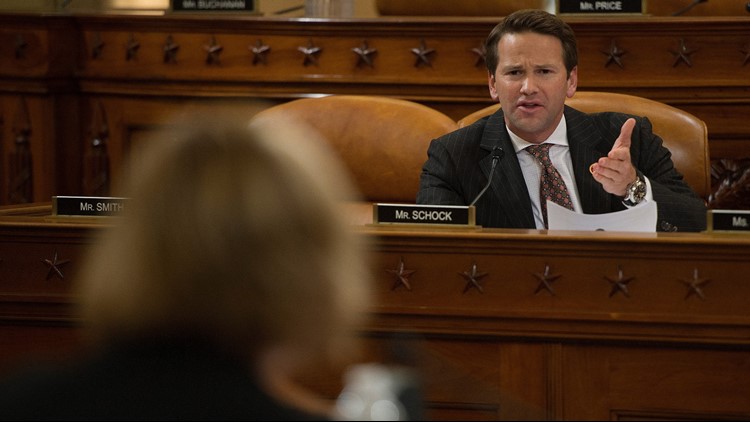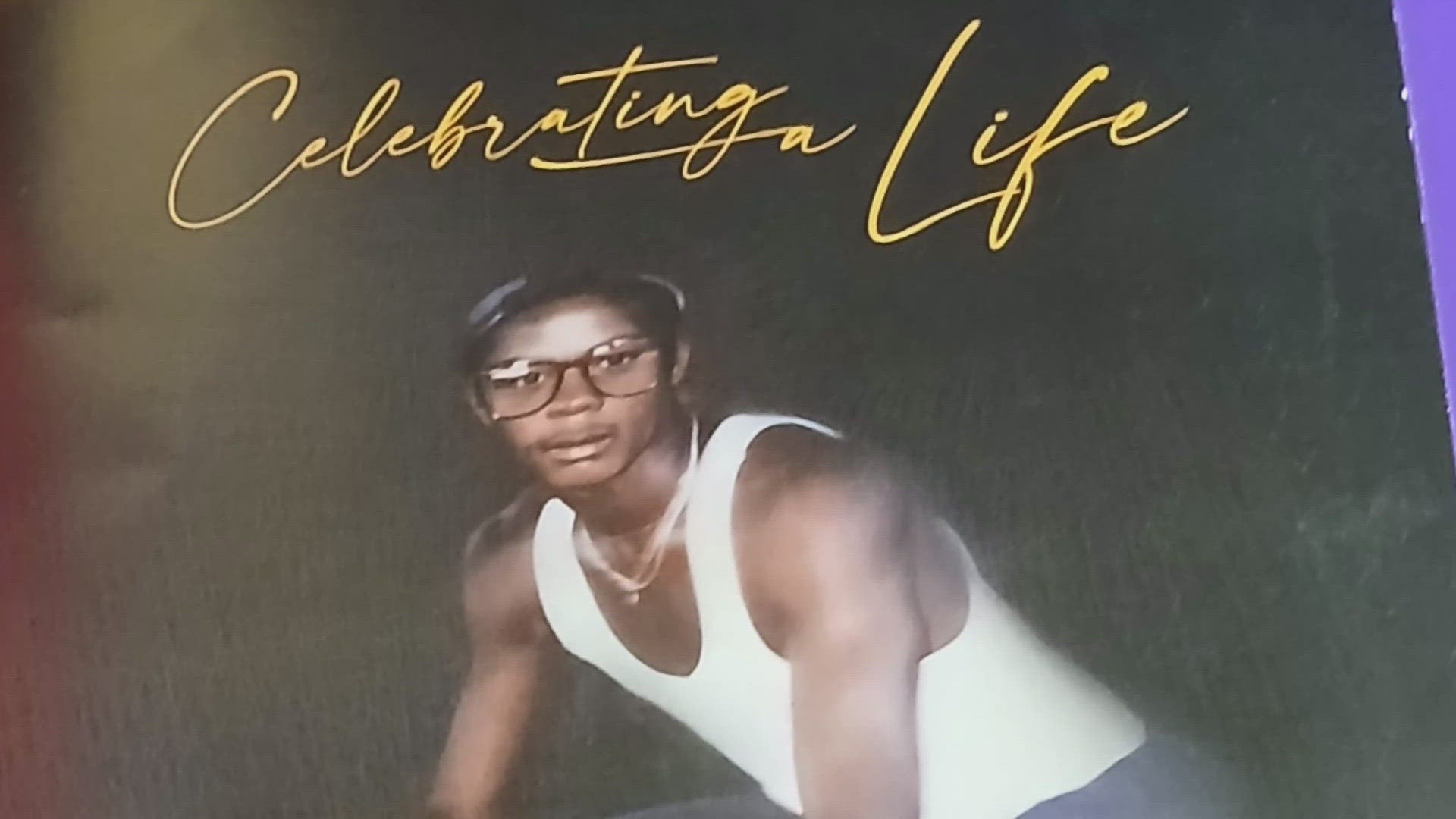CHICAGO (AP) — Growing sympathy for defense arguments, seeming confusion within the team of federal prosecutors and a disgruntled judge are among the signs that key portions of the corruption case against former U.S. Rep. Aaron Schock may be at risk of unraveling.
The question on which the outcome of the Illinois Republican's case may rest — and one an appeals court is currently mulling over — is whether prosecutors based their charges on ambiguous House rules in violation of separation-of-powers clauses in the U.S. Constitution.
Schock, who gained notoriety for redecorating his Capitol Hill office in the style of the "Downton Abbey" TV series, has long argued prosecutors did just that by bringing charges he illegally sought reimbursements for a $5,000 office chandelier and other personal spending.
But that constitutional argument has gained support since the 2016 indictment as prosecutors out of the U.S. attorney's office in central Illinois have disclosed their evidence against the Peoria resident, a prodigious GOP fundraiser in Congress before resigning in 2015.
"I think there is a genuine dispute here," said Daniel Petalas, a Washington lawyer and former prosecutor in the Department of Justice's public integrity section.
Real constitutional concerns and imprecise rules on which multiple charges are based "make this case an aggressive extension of the prosecutorial role," he said.
The U.S. House weighed in last month — days after Schock asked the 7th U.S. Circuit Court of Appeals in Chicago to toss all 22 remaining charges on constitutional grounds. Schock's trial in U.S. District Court in Urbana can't start until the 7th Circuit rules.
A friend-of-the-court filing by House counsel insists it's not taking a stand on whether or not Schock is guilty. But it then devotes 23 pages to reminding the 7th Circuit that precedent "forbids prosecution of congressional officials on charges that depend for their validity on a debatable interpretation of congressional rules."
Courts widely agree the Constitution bars prosecutors, as members of the executive branch, from charging legislative-branch members based on unclear congressional rules. They can be charged on the basis of clear rules that call for no interpretation, courts have also found.
Schock's appeal contends all the charges against him derive, directly or indirectly, from imprecise rules. It singles out rules relied on to allege fraudulent chandelier reimbursement. Rules prohibit reimbursements for "decorations" and "furniture", the appeal says, but don't define either word.
Prosecutors' response to Schock's appeal is due in March. But when the same issues arose in trial court, they balked at the notion the House rules are unclear. And they asserted that half of the charges have nothing to do with House rules anyway, including ones alleging Schock falsified income tax returns.
"This prosecution," one filing by prosecutors said, "is based on an unambiguous rule in the criminal law, applicable to laborer and Congressmen alike: do not lie or engage in a scheme to lie to obtain government or other funds."
Schock's trial judge, Colin Bruce, has given credence to constitutional arguments from the defense, albeit only partially.
In October, he tossed one count alleging Schock illegally pocketed leftover constituent-event fees, saying it rested on vague House rules prosecutors have no authority to interpret. And Bruce left open chances of dismissing more counts for the same reason, depending on how prosecutors structure their case for jurors.
Bruce, like Schock's lawyers, also framed the case as one testing a bedrock principle of the American political system.
"The case is rife with potential issues related to the separation of powers," he wrote in his October ruling dismissing two of 24 counts.
Prosecutors in Schock's case raised the judge's ire in a series of contradictory filings in which they first denied ever telling a grand jury Schock wasn't showing up to testify — potentially prejudicing jurors against him. They later acknowledged they had, in fact, made statements regarding testimony from Schock 11 times. Suspects aren't required to testify because of protections against self-incrimination.
Lingering distrust of prosecutors could influence how Bruce rules on critical pre-trial motions, which often include what evidence can be entered, said Jeffrey Cramer, a former federal prosecutor in Chicago and now managing director of the Berkley Research Group.
"If there are close calls, your reputation before a judge is sometimes all you have," he said. "Nothing is more important — and that has been tainted in this case."
There are signs Justice Department brass may also be losing confidence in the case.
After local prosecutors filed a notice they were appealing Bruce's dismissal of the two counts, a surprise February filing by Washington-based Justice Department official William Glaser withdrew that appeal, letting the dismissals stand.
Schock lawyer George Terwilliger echoed defense filings in a statement emailed Wednesday, accusing prosecutors of "creating rules for reimbursement and reporting ... then charging violations of those rules they made up." The U.S. attorney's office declined comment.
Schock can by no means rest easy.
He's still facing eight wire-fraud counts, one for seeking reimbursement for the chandelier. Each carries a maximum 20-year prison term. The other charges are: five counts of falsification of election commission filings, six of filing false income tax returns, two of making false statements and one of mail fraud.
A best-case scenario for Schock is that the 7th Circuit throws out the majority of the charges, Cramer said. But he added that even if just one or two survives, prosecutors can be expected to push to go to trial anyway.
Schock's lawyers know their best hope is to get courts — perhaps even the Supreme Court if they lose in the 7th Circuit — to jettison as many charges as possible on constitutional grounds. Cramer said nuanced constitutional arguments won't play well with jurors disgusted by a steady stream of political corruption cases in Illinois.
"It is very hard for a defense lawyer to say, 'Yes what he did was wrong, but these aren't crimes they are just violations of rules,'" Cramer said. "That's a tough argument. ... A trial jury is not going to have much patience for that."
___
Follow Michael Tarm at http://twitter.com/mtarm
___
AP writer Sadie Gurman in Washington, D.C., contributed to this report.



